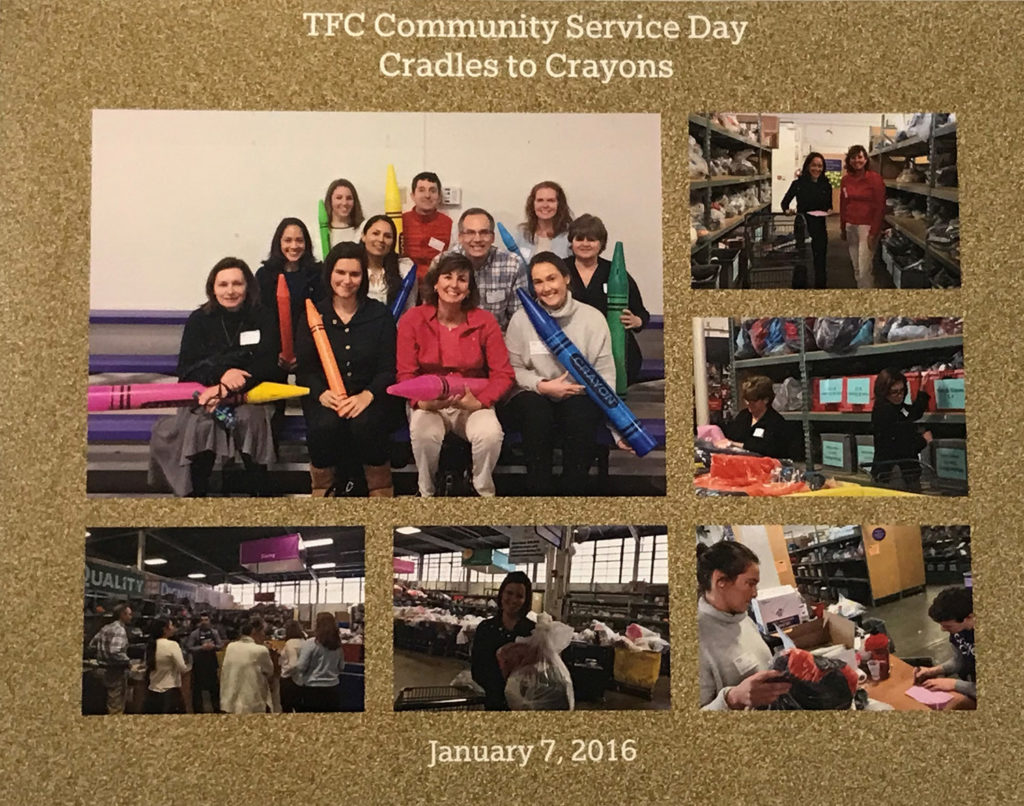Community Participation
Assessing the effect of a firm's or individual's involvement in the community is often made through the eyes of an outside observer or beneficiary. In the non-profit world, regulatory reporting requirements, mandated filings, and yearly community impact statements are imposed on the organization. Sometimes this results in a certain amount of storybook puffery which can lessen the effects of the organization's outreach from the perspective of an uninvolved reader. Until the recent establishment of the TFC Charitable Foundation, the firm's philanthropic efforts have been internally directed and channeled toward causes that have been chosen by individual members of the firm. That approach continues today and is very much encouraged.
At the heart of the student college debt crisis today is a lack of understanding of basic personal financial fundamentals. Unfortunately, personal financial literacy courses at the high school level are often burdened by political baggage, and the discipline is rarely offered as part of a required high school economics or social studies curriculum. Usually included in such courses, which generally last for only a single semester, are personal cash flow and debt management, saving and investing essentials, as well as an exploration of the behavioral biases involved in the decision-making process when confronted with the save-invest-or-buy equation. Without having been exposed to the debt management section in the personal financial literacy syllabus, a student aged 18 years will be ill-equipped to assess the trade-offs when comparing college level program costs against possible future career path rewards and pay-back odds.

A top priority for this writer and TFC has been a continuing effort to fund personal financial literacy curriculum development at the high school level. With longtime fellow-advocate and friend, Mark Tibergien, CEO of Pershing BNY Mellon Advisor Solutions, we have been successful in installing personal financial literacy courses at our respective high schools, one in Minnesota and the other in Michigan. Each program now serves as a prototype for other communities in its state, although parochial state legislative high school curriculum review committees and teachers' unions presently regard these seemingly sensible undertakings with suspicion. In each case, supplementary financial support from the private sector has been engaged locally, and a parents' support group enlisted to provide continuity into the future. In Minnesota, the program is offered as a "heavy elective" to juniors and seniors with nearly 200 students at Edina High School taking the full semester course each year.
In an e-mail to this writer in 2017, Mark summarized the reasons for his personal support of this activity at his Michigan high school as:
- To create more informed consumers of financial advice and more financially independent individuals.
- To demonstrate that this profession is a compelling career course for young people to take.
- To begin to rehabilitate the reputation of our business (i.e., RIA commissions-based brokers) in the eyes of the average American.
Mark's last point reflects his long immersion in the business dating back to an era when "Personal Financial Planning" (late 1970s & 1980s) was product-sales-driven and generally associated with what was earlier in this material termed an "implementation-fee, commission-based" compensation format.
Although not up to the level of TD Ameritrade's, Investnet's, or Northwestern Mutual's financial contributions, TFC also supported the personal financial literacy movement through major sponsorship of the CFP Board's Center for Financial Planning, located in Washington, DC (centerforfinancialplanning.org). Started in 2015, the CFP Board has seen an impressive increase in interest in the topic of personal financial literacy at the university level and the rising credibility of the subject matter for inclusion in high school curricula. CFP Board sponsored research and public forums publicizing the field of personal finance are now moving the concept forward toward acceptability at some state houses (e.g., Florida, Wisconsin, and Arizona) and the subject matter has become more difficult for the teachers' unions to resist.
In the spring of 2018, TFC launched its Charitable Foundation. The firm's shareholders donated startup funds, and the firm itself pledged to contribute a portion of its profits - client contributions are not allowed. The Foundation's mission is threefold: to promote financial literacy, to provide education and information about behavioral finance to help people achieve their financial goals, and to support local social programs. The Foundation will make annual distributions of at least 5% of its capital value during each fiscal year, grant recipients to be determined by an annually rotating group of staff members. Last year's donees were the Cambridge Housing Authority - WorkForce Program (for Financial Literacy Workshops), and U Aspire (College Access and Affordability Training).
Having charity as a part of its mission and business model from the outset, and regarding itself as assuming a fiduciary role in which its client's interests are always paramount, the concept of a firm-sponsored Charitable Foundation fits comfortably. Over time, TFC's Fund's resources and impact will hopefully grow, but its focus will no doubt remain closely associated with the firm's desire to educate a more informed consumer of financial advice and services.
Other charitable causes individually supported in the recent past and currently by members of the firm directly include Board Memberships at Brandeis University, Cambridge Community Foundation, Green Century Funds, The International Museum of World War II, the Maine Maritime Museum, Lown Institute, and the Pioneer Institute.
____________
Proceed to Client Events; Expanding Horizons and Relationships >
< Return to Helping Clients Gain the Confidence to Act Rationally in their Own Best Interest
Sign The Guestbook
The author welcomes your feedback. Please sign the Guestbook to let us know of your visit to this website. There is a place to offer your suggestions, comments and/or questions.
